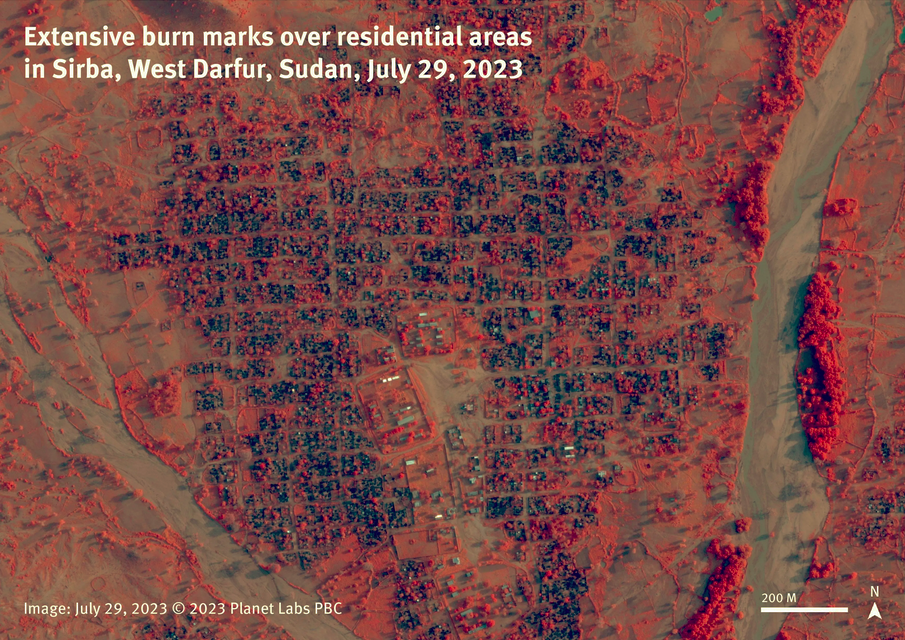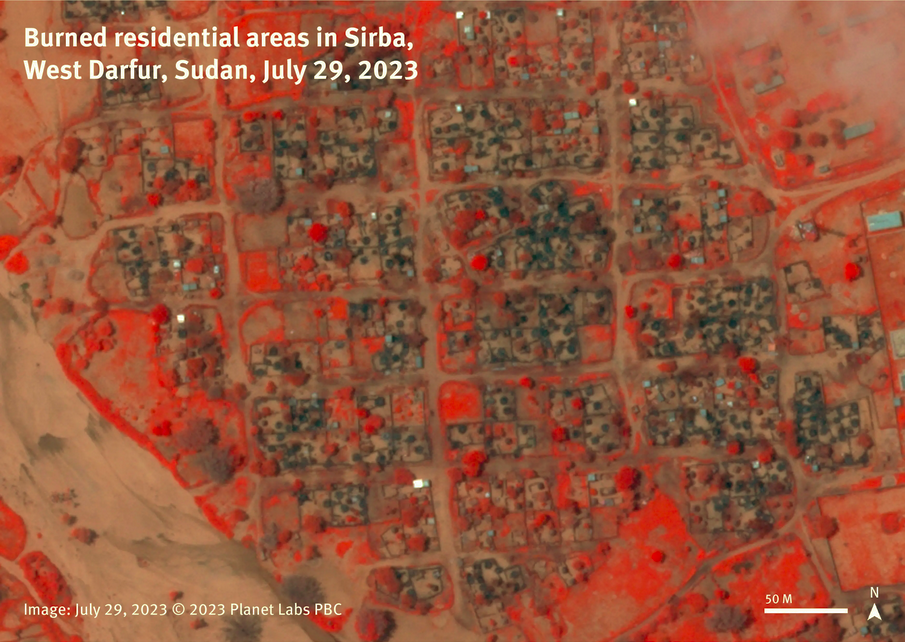Images of destroyed Darfur villages evoke ‘scorched earth’ campaigns

Infrared satellite image taken on July 29 shows residential areas of Sirba, West Darfur, affected by burning. On infrared images, the vegetation appears in red and the burned areas more clearly in a darker colour. (Source: Planet Labs PBC)
Human Rights Watch (HRW) has reported “massive fire destruction in the town of Sirba” in West Darfur in late July this year, shown in satellite data collected by the advocacy organisation that investigates and reports human rights abuses across the world.
The report, published on August 4, said that Sirba “is the seventh village or town that has been nearly destroyed or burned completely to the ground in West Darfur since April,” including Habila, Misterei, Murnei, and Megmari.
People who managed to flee Sirba in West Darfur told Radio Dabanga of ethnic cleansing and report tragic details of the attacks by the Rapid Support Forces (RSF) and allied Arab gunmen on the town, which fell into RSF hands at the end of last month. Murnei has reportedly been experiencing similar violence.
On July 31, Radio Dabanga reported that legal rights activist Mohamed Teirab estimated the initial death toll at 460 people. Thousands have been wounded.

Amnesty International’s 56-page report, published on August 3, documents mass civilian casualties “in both deliberate and indiscriminate attacks by the warring parties.” The report also details “sexual violence against women and girls, targeted attacks on civilian objects such as hospitals and churches, and extensive looting.” Some women were held in conditions amounting to sexual slavery in the capital Khartoum and the western region of Darfur.
The “spiralling violence” in Darfur “is raising the spectre of the scorched earth campaign of previous decades, at times involving some of the same actors,” said Agnès Callamard, Amnesty International’s Secretary General.
The report’s co-author, Donatella Rovera, told the Associated Press that “sexual violence has been a defining element of this conflict from the start. Civilians don’t have any good options. It’s hard for them to leave. It’s very dangerous for them. Almost all rape cases have been blamed on the RSF and allied Western militias.”
In response to the report, the army confirmed that it had set up a unit to try to minimize harm to civilians, while the RSF denied allegations of sexual violence as well as violence in West Darfur, and that it did not target the Masalit African community in the area. Rather, Masalit gunmen allegedly targeted Arabs suspected of siding with the militias.
“The world should not stand by as town after town in West Darfur is burned to the ground, sending tens of thousands of civilians fleeing for their lives,” said Tirana Hassan, executive director at HRW. “The United States government needs to put words into action and ensure that the UN Security Council finally acts to protect civilians and to hold those responsible for the atrocities to account.”
US Ambassador to the United Nations Linda Thomas-Greenfield said in a media interview: “The UN Security Council has a responsibility to deal with peace and security around the world, so what happens in Sudan must be on the agenda. Council members should begin by condemning those who do not respect the current arms embargo on Darfur and applying targeted sanctions against those responsible for ongoing violations,” including sexual violence and blocking humanitarian access. The ambassador also mentioned the need to support ongoing investigations of the International Criminal Court in Darfur.











 and then
and then